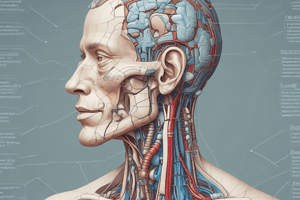Podcast
Questions and Answers
What is the meaning of the suffix 'itis' in medical terminology?
What is the meaning of the suffix 'itis' in medical terminology?
- Infection or inflammation (correct)
- Enlargement
- Surgical removal
- Tumor or growth
Which of the following prefixes indicates a condition of being above normal?
Which of the following prefixes indicates a condition of being above normal?
- hypo
- macro
- intra
- hyper (correct)
What does the root word 'nephro' refer to in medical terms?
What does the root word 'nephro' refer to in medical terms?
- Liver
- Kidney (correct)
- Heart
- Bone
In medical terminology, which abbreviation stands for 'Acquired Immunodeficiency Syndrome'?
In medical terminology, which abbreviation stands for 'Acquired Immunodeficiency Syndrome'?
The term 'hemat' in medical terminology is associated with which type of tissue or fluid?
The term 'hemat' in medical terminology is associated with which type of tissue or fluid?
What is the role of a prefix in medical terminology?
What is the role of a prefix in medical terminology?
Explain the significance of the root word 'aero' in medical terms.
Explain the significance of the root word 'aero' in medical terms.
How does the suffix 'ectomy' affect the meaning of the root word it is attached to?
How does the suffix 'ectomy' affect the meaning of the root word it is attached to?
Describe how the abbreviation 'IV' is relevant in medical contexts.
Describe how the abbreviation 'IV' is relevant in medical contexts.
What does the prefix 'macro-' indicate when used in medical terminology?
What does the prefix 'macro-' indicate when used in medical terminology?
Flashcards are hidden until you start studying
Study Notes
Medical Terminology
- Root Words form the basis of medical terms and denote meaning.
- Prefixes modify the root word, adding information like location, quantity, or state.
- Suffixes indicate a characteristic or condition related to the root word.
Common Root Words
- colo: colon
- arthro: joint
- phlebo: vein
- heap/hepato: liver
- hemat: blood
- pyo: pus
- aero: air
- cranio: skull
- cardio: heart
- thrombo: clot
- myo: muscle
- pyro: fever
- arterio: artery
- nephro: kidney
- cyto: cell
- osteo: bone
Common Prefixes
- a/an: without/absence
- intra: inside/within
- anaero: without oxygen
- hyper: increased/above
- hypo: decreased
- macro: large
- mono: one
- pseudo: false
- poly: many
- nano: billionth
- pre: before
- homo: same, like
- iso: same
- cryo: cold
- micro: small
- neo: new
Common Suffixes
- megaly: enlargement
- emia: blood condition
- ostomy: make an opening/mouth
- ectomy: surgical removal
- itis: inflammation of
- oma: tumor, growth
- tome: cutting instrument
- uria: urine
- meter: measure
- blast: young
- pathy: disease
- cidal: killing of
- penia: deficiency
- poiesis: formation
Common Medical Abbreviations
- DOH: Department of Health
- CHED: Commission on Higher Education
- VDRL: Venereal Disease Research Laboratories
- AIDS: Acquired Immunodeficiency Syndrome
- AIDs: Autoimmune Disorders/Diseases
- AMI: Acute Myocardial Infarction
- BUN: Blood Urea Nitrogen
- 2PPBS: 2 hours Postprandial Blood Sugar
- AFS: Acid Fast Stain
- PCQACL: Philippine Council for Quality Assurance in Clinical Laboratories
- FBS: Fasting Blood Sugar
- IV: Intravenous
- HIV: Human Immunodeficiency Virus
- IU: International Unit
- ICU: Intensive Care Unit
- K: Potassium
- Na: Sodium
- NPO: Nothing Per Orem
- BAP: Blood Agar Plate
Root Words
- colo: colon
- arthro: joint
- phlebo: vein
- heap/hepato: liver
- hemat: blood
- pyo: pus
- aero: air
- cranio: skull
- cardio: heart
- thrombo: clot
- myo: muscle
- pyro: fever
- arterio: artery
- nephro: kidney
- cyto: cell
- osteo: bone
Prefixes
- a/an: without/absence
- intra: inside/within
- anaero: without oxygen
- hyper: increased/above
- hypo: decreased
- macro: large
- mono: one
- pseudo: false
- poly: many
- nano: billionth
- pre: before
- homo: same, like
- iso: same
- cryo: cold
- micro: small
- neo: new
Suffixes
- megaly: enlargement
- emia: blood condition
- ostomy: make an opening/mouth
- ectomy: surgical removal
- itis: inflammation of
- oma: tumour, growth
- tome: cutting instrument
- uria: urine
- meter: measure
- blast: young
- pathy: disease
- cidal: killing of
- penia: deficiency
- poiesis: formation
Abbreviations
- DOH: Department of Health
- CHED: Commission on Higher Education
- VDRL: Venereal Disease Research Laboratories
- AIDS: Acquired Immunodeficiency Syndrome
- AIDs: Autoimmune disorders/diseases
- AMI: Acute Myocardial Infarction
- BUN: Blood Urea Nitrogen
- 2PPBS: 2 hours Postprandial Blood Sugar
- AFS: Acid Fast Stain
- PCQACL: Philippine Council for Quality Assurance in the Clinical Laboratories
- FBS: Fasting Blood Sugar
- IV: Intravenous
- HIV: Human Immunodeficiency Virus
- IU: International Unit
- ICU: Intensive Care Unit
- K: Potassium
- Na: Sodium
- NPO: Nothing Per Orem
- BAP: Blood Agar Plate
Studying That Suits You
Use AI to generate personalized quizzes and flashcards to suit your learning preferences.




